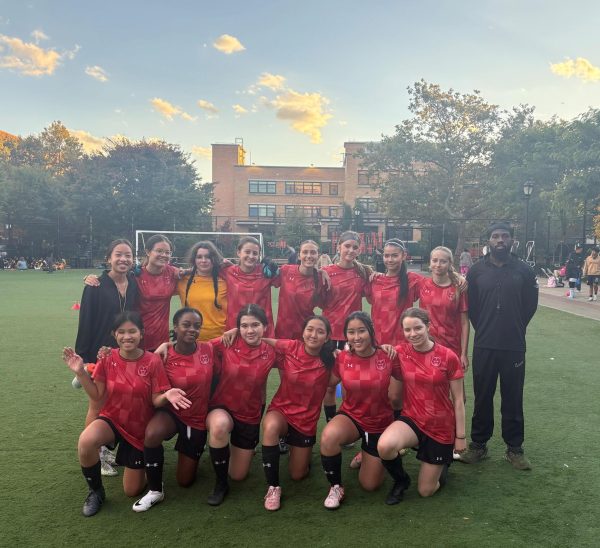Competitive Tetris: An Interview with Luca Suarez
After weeks of convincing, Luca Suarez, a senior at BASIS Independent Brooklyn, reluctantly agreed to let me interview him on his unusual side hobby: competitive Tetris.
Yasmin: “How did you get started?”
Luca: “I started playing Tetris in seventh grade, roughly 5 years ago. Honestly, I was just really bored on my 45 minute bus ride home, and the app was free. My mom used to play Tetris in college and she always told me how good she was, so I thought it would be fun to see how I compare. But I ended up playing every day on the ride home from school, and now, 5 years later, I’ve clocked over 350 hours in the game. So I’d say I was hooked from the start.”
Y: “What’s the average game like? Do you have any rivals?”
L: “Firstly, for the uninformed reader, the objective of Tetris is to clear as many lines of blocks as possible by fitting together colorful puzzle pieces; you lose when you hit the top of the board, which we call “getting topped” in the Tetris community. I wouldn’t go as far as to say the game is intellectual or strategic, because at some point, fitting the blocks together becomes almost like muscle memory. It’s hard to describe, but to me, playing Tetris is as natural as mindlessly fiddling with a Rubick’s cube. I typically play when I’m watching TV or talking with my friends just as something to keep my hands busy. I started playing competitively to find a part of the game that would challenge me enough to force me to focus. When I play a game of competitive Tetris, it almost feels like I enter a sort of tunnel vision, a ‘cuber mindset’ if you will. If you don’t know what a cuber is, let’s just say it’s a term for avid tetris players. As the game goes on, I block out everything around me, focusing only on the dropping blocks. As for a rival, I recently started playing against my good friend, Oliver K., but he’s not nearly as good as me, and I pretty much hate his guts.”
Y: “What’s the difference between regular and competitive Tetris?”
L: “In regular Tetris, you play against yourself and your skill limit. Once you learn how the game works, you’re pretty much just playing in a void of your own high scores. I think at some point, you stop getting stimulated by the game and fall into a rhythm of your own technique. The game’s still fun, but you’re not really learning anymore. In competitive, you’re actually playing against another person, and you have to rethink the way you play. Every line you clear gets sent to your opponent, and vice versa. It adds an element of danger to one of the most relaxing games ever made, which I think is ironic.”
Y: “What are some competitive Tetris strategies?”
L: “The most common tactic is piling everything into a tower and using a long piece to clear as many as possible. There’s also ‘T-spinning’, a technique where you make a T-sized hole in one of the columns and fit a T-shaped piece into that whole which gives you extra points.” (In this part of the interview, Luca was visibly uncomfortable, and said talking about ‘T-spinning’ was dehumanizing.)
Y: “Do you play any other games? What makes Tetris special?”
L: “My heart belongs to Tetris, although I do play a lot of multiplayer games like Vigor or Fortnite with my friends in my spare time. I think part of the reason I play it so much is because it’s somehow both distracting and completely mindless. It lets me temporarily pretend that the biggest challenge I have to face is just fitting colorful blocks together in a row.”
Y: “Has your Tetris background ever influenced other aspects of your life?”
L: “One time I was walking to school when I passed the local orphanage in Red Hook. I noticed the building was on fire, and parts of it were falling in block-like shapes. Suddenly, I realized exactly how to get all the orphans out in time! ” (He laughs) “No, I’m just kidding. I’m actually doing a research paper for my neuroscience course on how Tetris can be used as a form of rehab for methamphetamine addicts. It’s pretty interesting to play a game for years and then learn about the real psychological effects it can have on the brain. A 20-minute game of Tetris can help with everything from memory recovery to food cravings. There are some side effects, though. Things like ‘gamer fatigue’ and ‘gamer rage’ often get to me; the post-game banter gets a little out of hand sometimes.”
Y: “Has it ever hindered your social life?”
L: “Oh, no, never. I’d say if anything, it’s helped me make connections with people from around the world. Did you know President Barack Obama is a cuber? It’s true. I’ve played a couple of games with him, and I’d say he’s pretty good. Definitely not as good as me though.” (Nate S., a close peer of Luca’s and an avid competitive Tetris spectator says otherwise).
Nate: “Oh, 100%, it does. He doesn’t like talking to me when he’s playing, and often yells at me in a violent rage saying ‘Shut up! I’m cubing!’. He doesn’t even leave the house anymore. I think he told me once he’s gone without eating or sleeping for a week during a tournament. I’ve definitely been scared for his health before. All of his friends see the effects of it. Also, Obama totally beat him like twice.”
Thanks to Luca Suarez, the BASIS Independent Brooklyn community was able to learn about the ins and outs of competitive Tetris.
Yasmin is a senior at BASIS Independent Brooklyn. Her favorite class is AP Environmental Science, and she likes animals. Her favorite movie is Le Diner...











